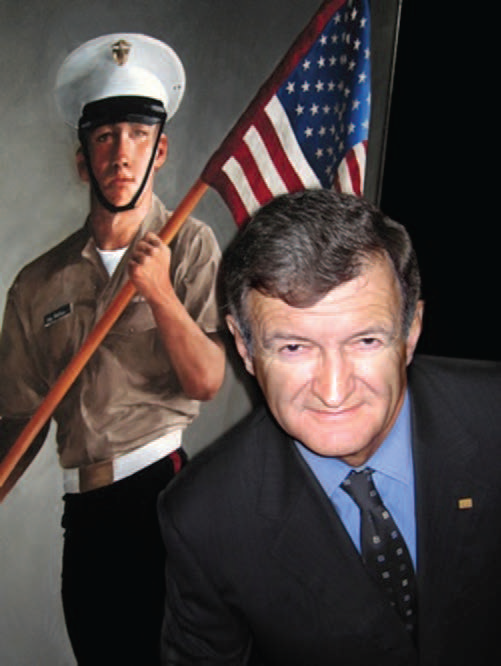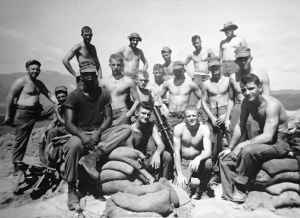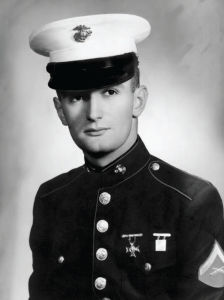
Terry Salman: American Marine and Canadian Philanthropist
By: Col Mary H. Reinwald, USMC (Ret)Posted on July 15, 2023
Most Marines know that the fabric of our Corps is woven from throughout the nation. Marines join from every state and even from foreign countries, often with the goal of becoming a citizen of the United States. But a Canadian citizen who enlists during the Vietnam War with no desire to renounce his Canadian citizenship and become an American? That’s pretty unusual, but even more rare is when that same Marine goes on to become a highly successful businessman and philanthropist. Veteran Marine, successful businessman, and generous philanthropist Terrance K. “Terry” Salman is such a rarity.
Salman recently sat down for an interview with Leatherneck to discuss his service and his focus on philanthropy after his highly successful business career in Canada. Decades after his time in the Corps ended, Salman remains a loyal Leatherneck reader and even referenced two of the magazine’s articles in his recently published book, “What We Give From Marine to Philanthropist: A Memoir.” The interview took place via Zoom which made it easy to see that Salman embodies the old adage, “Once a Marine, always a Marine.” Behind his desk is a large portrait of a Marine waving the American flag, painted by famous Canadian artist, Attila Richard Lukas. It’s clear that Salman is proud to be a Marine.
Canadian by Birth
Growing up in a large family in Quebec, Canada, Terry Salman was a relatively mediocre high school student whose future wasn’t clearly defined. Meeting a Marine recruiter over the border in Platsburg, N.Y., Salman was intrigued listening to all the benefits of service, especially travel, but it was a photo behind the recruiter’s desk that actually sealed the deal. “I had a fondness for JFK [John F. Kennedy], the commander in chief, and behind the recruiter’s desk was a portrait of the commander in chief.” At that time, his only knowledge of the Corps came from reading the Leon Uris classic, “Battle Cry.” Nevertheless, Salman decided the Marine Corps was for him. The recruiter expedited the required green card, and Salman was off to recruit training at Marine Corps Recruit Depot Parris Island.
Salman said “The DIs were very suspicious,” about his citizenship but added that it was only at Parris Island that being a Canadian was ever an issue during his time in the Corps. “I was happy in the Marine Corps. They didn’t really care if I was Canadian. It never came up after boot camp.” And like many Marines, Salman considers his best day in the Corps to be the day he graduated from recruit training at MCRD Parris Island.
Vietnam
Salman was assigned to the infantry during his six years in the Marine Corps and he quickly advanced through the ranks to the grade of sergeant. He served in Vietnam with 1st Battalion, 4th Marines as a section leader. “I was an 0341, 81 mm mortars,” said Salman. “What mortars have to do to support a platoon is incredibly important and takes a lot of planning and training.” He later took the lessons he learned from his time as a grunt and applied them to both his business endeavors and philanthropy. “Keep your focus on the ultimate objective which the Marine Corps focuses on, whether a combat mission or training a unit or how to train individuals to become a better Marine. Teamwork is incredibly important.”
When asked about the impact his service in Vietnam had on him, Salman responded positively. “It gave me a much different view. I’ve tried to take a worldly view about what is right and what is wrong, that different countries have different ways of looking at things. Having lived in the United States, everybody called it Camelot, it was a high standard. Things are different today, not only in the United States but elsewhere. There’s more political uncertainty than there was in my time.”
Entering the Business World
After leaving the Marine Corps, Salman returned to Canada and began working in the mining industry with a focus on finance. He achieved significant success at Nesbitt Thompson, a Canadian stock brokerage firm, and later at his own financial advisory firm, Salman Partners, where he was president and chief executive officer and where he raised funding for hundreds of companies in the mining and exploration fields. As the current president of Salman Capital and chairman of New Pacific Metals Corporation, Salman’s business successes have been numerous, and he credits his time in the Corps for setting him on the path to success.
“It was really the foundation of my life because the Marines taught me everything was possible. You just have to be patient. You have to work at it. The guiding principles of following procedures, having a good plan, your own plan, your unit’s plan, those are things that I learned from and used.” Salman referenced other lessons from the Corps including discipline, accountability and responsibility. “The many courses I attended in the Marine Corps helped me become sergeant in less than four years. They were incredibly helpful; they taught me a lot about what it takes to persevere, to look for higher goals.”

Philanthropy
His philanthropic efforts grew in parallel to his business successes. According to Salman, philanthropy went hand in hand with his service as a Marine. “Philanthropy is not much different. Some of the core values that Marines learn apply in philanthropy. Marines taught me to help people, and philanthropy is all about helping mankind in a broad sense. I don’t see much difference.”
Veterans’ causes are just one of the many efforts upon which Salman has focused over the years. The Canadian organization, Veterans Transition Network, is especially close to his heart. The organization provides post-traumatic stress treatment to Canadian veterans and American veterans who live in Canada. Encountering one recipient of the organization’s programs and support, Salman was reminded again of the impact of helping others. The veteran told him, “They saved my life. I wouldn’t have seen my daughter graduate without them.” Salman strongly believes that for those who have been blessed with health or a good job, the challenge is to do more. “Veterans are the most marginalized in society in many ways. They suffer from so many things, including a large portion of homelessness, which is a big North American and global crisis to be honest. There’s much more to do.”
Of the many ways Salman has given back, his support of those with AIDS at a time when many shunned them was perhaps most impactful. “When you saw people who had marks on their face and losing weight, I was at the forefront of a hospital that embraced them which was so enriching to see. In those days they were the most marginalized/ostracized people, everyone saw it as a gay man’s disease but of course, it wasn’t. It was uplifting to sit in an environment where you could do something.” According to Salman, his support of those suffering what was at the time an incurable disease is one of his greatest legacies, and again, his efforts to support that particular community also had some roots back to his time in the Corps.
“Philanthropy is about trying to overcome adversity; making the world a better place, more giving, more inclusive, and ironically, I learned that from the Marines—inclusion. We could be supportive in other ways. I learned not to turn my back on people who were different than me. That’s what enabled me to take the AIDS initiative, which was so important.”
Loyalty is vastly important to Salman and is a theme throughout “What We Give.” “That came from my time in the Marine Corps. The Marines are big on loyalty. That’s what Semper Fi is all about. I never forgot that.” He continued, “One of the frustrations I have, not so much in philanthropy but in business, is getting the same kind of loyalty. Six years in the Marine Corps today would seem like an eternity to a young person. That’s a big thing with me.”

Legacy
Like all good Marines, Salman has spent most of his life serving as an example to others. In addition to his philanthropic efforts, which include raising millions for everything from public libraries to hospitals, Salman wrote, “What We Give From Marine To Philanthropist: A Memoir,” in the hopes that his story would serve as inspiration. “The world is full of tragic stories and suffering people. So, for those of us who have the opportunity to give back, it just seems like the moral thing to do.”
He continues to look for opportunities to help others even today. “Giving back gets easier … it has such rewarding characteristics. Small things go a long way. I’m always looking for new ways to help move my philanthropy forward.” And when asked to describe his legacy, Salman again focused on serving others. “I would hope that they would think about not just about how much money I made, helping to create a better world in the charities and philanthropies that I engaged with. There’s more things to do. That’s what I’m looking forward to for the rest of my life; trying to do more, like the Marines do with less.”
Author’s note: More information on “What We Give From Marine to Philanthropist: A Memoir” and how it can be purchased can be found at www.whatwegivebook.com.
Author’s bio: Col Mary H. Reinwald, USMC (Ret) served 27 years on active duty and retired in 2014. She was the editor of Leatherneck and the vice president for strategic communication for the Marine Corps Association until earlier this year.






